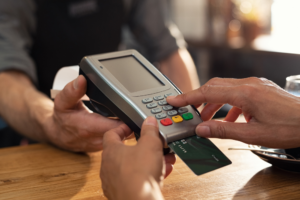
Card surcharges: Are you paying too much?
Last updated on May 29th, 2025
Ever wondered why your cup of coffee costs an extra 15 cents at one café and not another? Or when you go to pay for petrol with Visa or Mastercard, you're told it will cost another 1.5 percent? These added costs are known as card surcharges and while they might not account for much in one or two transactions, they certainly add up.
The Albanese Government is preparing to ban debit card surcharges - the amount a business charges to cover the cost of an electronic transaction – from 1 January 2026, pending a review by the Reserve Bank of Australia (RBA). Treasurer Jim Chalmers said consumers should not be punished for using cards or digital payments.
“At the same time, small business shouldn’t have to pay hefty fees just to get paid themselves,” he said. “We’re prepared to ban debit card surcharges, subject to further work by the Reserve Bank and safeguards to ensure small businesses and consumers can both benefit from lower costs.”
The RBA estimated that consumers were losing almost $1 billion a year in card surcharges, including credit card surcharges. But with the rise of tap and go electronic payments, Canstar research put the cost as high as $4 billion, or about $140 a year for the average Australian shopper.

As part of its review, which is open for submissions until December, the central bank is also considering restricting how much card providers can charge retailers to use their services, so that businesses don’t feel the pain if consumers are no longer helping with that impost.
Mastercard and Visa warned this could put an end to protection for consumers that the fees helped pay for, including refunding card holders if they have been the victims of fraud or goods they have ordered don’t arrive.
“Further regulation could restrict the ability to deliver these protections and benefits to consumers,” Visa’s country manager, Alan Machet, told The Australian Financial Review.
How do card surcharges work?
Businesses have to pay merchant fees to accept card payments, with RBA data showing the average fee paid by small businesses is about three times higher than larger counterparts. They then pass these costs on to consumers in the form of surcharges.
Different cards incur different costs for the business, so payments made using a regular debit card may cost less for the business to process than a premium credit card, so the surcharge for using the credit card might be higher.
The Australian Competition and Consumer Commission (ACCC) introduced a ban on excessive surcharges in September 2016 to prevent profiteering, ensuring that businesses should only be passing on the amount it cost them to make that transaction.

The average cost for different payment types is
-
- Eftpos: less than 0.5%
- Visa and Mastercard debit: between 0.5% and 1%
- Visa and Mastercard credit: between 1% and 1.5%
The ban does not apply to transactions using
-
- BPAY
- PayPal
- Diners Club
- American Express cards issued directly by American Express
- Taxi fares, whatever the payment type
While the Australian Government awaits the outcome of the RBA review, it has given the ACCC $2.1 million to investigate “illegal and unfair surcharging practices”.
The RBA is also considering making least-cost routing, which is designed to process payments via the cheapest network, the default setting for merchants’ electronic terminals to help keep surcharges down.
How often do I pay a surcharge?
Probably more than you know. While the average Australian might pay about $140 in surcharges a year, if you use your debit or credit card to pay for all goods and services, it can add up to quite a bit more.
Although the RBA gave businesses the right to impose a surcharge on card transactions, it is up to them if they do so. While they are allowed to recoup the cost of processing card payments, some may choose not to apply debit or credit card surcharges if they think it gives them a competitive advantage or they are able to absorb those costs.
Smaller businesses are more likely to pass on the costs, as they don't have the bargaining power to push for lower fees for the use of electronic payment systems, and their margins are much tighter.
Some businesses find other ways to integrate those costs into the price of their goods or services, effectively spreading the cost across all customers whether you pay with cash or card.

Do they have to tell me about the surcharge?
The answer is a resounding "yes". As part of the ACCC’s regulations to ensure transaction transparency and fairness, businesses are legally required to notify you about any surcharges applied to your transaction before you make a payment.
This could be through a sign at the register, on the menu or the website, or even verbally by the staff. If you're shopping online, the website should display the surcharge information before finalising your transaction. Don’t let your card surcharge be supercharged.
What if a surcharge is excessive?
Assuming the Government is successful in its bid to ban debit card surcharges, the change is more than a year away, and credit card surcharges will still apply either way. It pays to be more vigilant whenever you are buying goods and services because every little bit helps, right?
Ask what the surcharge is when you go to pay and don’t be afraid to challenge the amount if it is not within legal limits. There are also some simple ways to keep your card surcharges down.
If you feel you have been hard done by with card surcharges or a merchant is doing the wrong thing, lodge a complaint with us and we’ll help you handle it.






